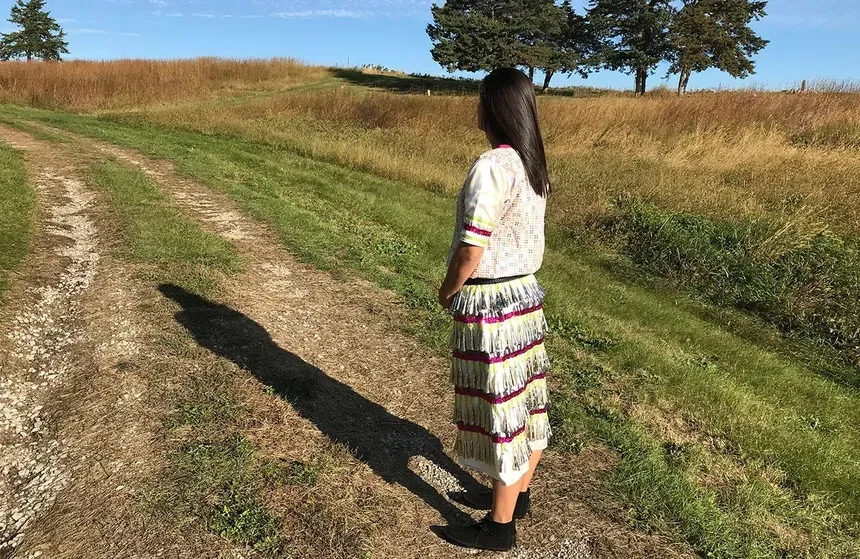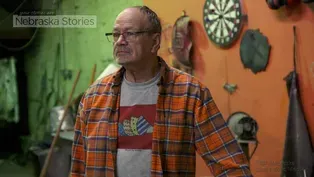
Seven Years a Correspondent
Clip: Season 14 Episode 13 | 9m 55sVideo has Closed Captions
She was the longest serving American correspondent of the Vietnam War.
Born in Hebron, Beverly Deepe Keever graduated from the University of Nebraska at Lincoln in 1957 with a double major in journalism and political science. In February of 1962, at the age of 26, Beverly arrived in Saigon. She soon began covering the escalating conflict Beverly often put herself in harm's way, and her first-hand account of the Battle of Khe Sanh was nominated for a Pulitzer Prize.
Problems with Closed Captions? Closed Captioning Feedback
Problems with Closed Captions? Closed Captioning Feedback
Nebraska Stories is a local public television program presented by Nebraska Public Media

Seven Years a Correspondent
Clip: Season 14 Episode 13 | 9m 55sVideo has Closed Captions
Born in Hebron, Beverly Deepe Keever graduated from the University of Nebraska at Lincoln in 1957 with a double major in journalism and political science. In February of 1962, at the age of 26, Beverly arrived in Saigon. She soon began covering the escalating conflict Beverly often put herself in harm's way, and her first-hand account of the Battle of Khe Sanh was nominated for a Pulitzer Prize.
Problems with Closed Captions? Closed Captioning Feedback
How to Watch Nebraska Stories
Nebraska Stories is available to stream on pbs.org and the free PBS App, available on iPhone, Apple TV, Android TV, Android smartphones, Amazon Fire TV, Amazon Fire Tablet, Roku, Samsung Smart TV, and Vizio.

Do you have a Nebraska Story?
Do you have a story that you think should be told on Nebraska Stories? Send an email with your story idea, your name, your city and an email address and/or phone number to nebraskastories@nebraskapublicmedia.org. Or, click the link below and submit your information on nebraskastories.org.Providing Support for PBS.org
Learn Moreabout PBS online sponsorship(helicopter whirring) (equipment rattling) [Narrator] On April 29th, 1975, South Vietnam's government and military collapsed as North Vietnamese troops attacked Saigon.
(helicopter whirring) US forces rescued 7,000 Americans and South Vietnamese allies in our country's sobering end to the Vietnam War that left more than one and a half million people dead.
(helicopter whirring) 88-year-old Nebraskan Beverly Deepe Keever reported on that war and the risks that came with it.
[Keever] This American advisor said very casually, "Don't worry, you never get the first bullet that gets you."
[Narrator] Back then her newspaper byline was Beverly Deepe.
She was America's longest serving Vietnam war correspondent.
(gentle music) Born in 1935 in Hebron, Nebraska.
Beverly Deepe's parents' tireless work kept the family farm afloat in the Great Depression.
(gentle music) It also inspired in Beverly a curiosity to explore faraway places.
I went into journalism because I wanted to understand people and culture in other countries.
(gentle music) [Narrator] With journalism degrees from the University of Nebraska and New York's Columbia Journalism School, Keever worked as a public opinion pollster and a freelance reporter after college.
(gentle music) She bought a ticket to East Asia and paid for her travels teaching English and selling freelance newspaper stories.
[Brooke] So this is someone who's got a halo, you know, she's anointed.
There's something really marvelous about her in her sense of herself.
Even coming from a small Nebraska town.
(gentle music) [Narrator] In 1962, Keever arrived in Saigon, drawn by the news of South Vietnamese troops fighting Viet Cong guerrillas backed by Communist North Vietnam.
(gentle music) [Mitch] It's a tinderbox.
Hasn't quite exploded when she's there in the early 1960s and there's still a lot of questions about where America's gonna go, where America's role is.
[Narrator] US military advisors were involved too.
Sent by President John F. Kennedy to stop the spread of communism.
[Larry] The words were repeated again about how in in Vietnam, literally, the free world stood in the balance.
[Narrator] As more US troops poured in, Keever wrote to a friend in Nebraska.
[Wartime Keever] I am undergoing a shock treatment here.
All those professional and personal ideals which had never been shattered until I reached here seemed to be under constant bombardment.
(gentle music) [Narrator] Keever was the only woman among a handful of male correspondents covering South Vietnam at the time.
The men earned full-time pay with health benefits.
Keever did not.
Because she didn't have healthcare, Keever almost died from an infection on one war reporting trip.
[Keever] An American secretary with the construction company found me and got me to the hospital.
That took me a long time and it still has left my liver damaged from infectious food and water and so on.
[Narrator] Keever persevered and kept reporting.
[Brooke] For a woman to make a career, if you're willing to be a stringer, you can find a war and it's easy to get hired because everyone is happy to hire you for cheap.
[Keever] When I was finally hired for "Newsweek" they said, "Well, I don't know what New York will say about hiring a woman."
They were stuck though.
They had to find somebody.
[Narrator] She wrote about US military and South Vietnamese pacification programs, which provided rural villagers with medical care and new schools.
She covered America's steady military buildup in South Vietnam too.
[Keever] It turned out to be more than I bargained for.
I got a war with it.
(weapon booms) (explosion booms) [Narrator] In 1964, as American involvement in Vietnam escalated, Keever became a full-time special correspondent with the "New York Herald Tribune."
A tip from a South Vietnamese general helped Keever break one of her biggest stories.
[Keever] Interviewed the first North Vietnamese prisoner who said he came in from North Vietnam in units.
[Narrator] President Johnson though, was up for election at the time.
[Keever] Johnson did not want to be, you know, doing anything to retaliate against the North, and so they denied it.
[Narrator] Keever says it was a tip off that partisan politics was leading US decision making on the Vietnam War.
One month later, the US Congress approved the Tonkin Gulf Resolution.
Vietnam now became America's war, with General William Westmoreland in command.
(upbeat 1960s music) (upbeat 1960s music) Westmoreland preached search and destroy military tactics and he requested more US troops to find and kill the enemy.
Keever believes that was a misguided philosophy.
[Keever] That's all they knew.
They had to fight with what they had, but they didn't have the right machinery.
[Narrator] The Viet Cong were no match for America's fire power.
But Keever reported they were winning support and recruiting new fighters from South Vietnam's poor villages.
[Keever] I wanted to get the Vietnamese viewpoint, and I did write it, and they were very, very blunt.
(gun shots) [Narrator] By 1967, more than a half million US soldiers were fighting in Southeast Asia and 200 of them were dying in combat each week.
The war was not getting better for America.
(explosions booming) 4,000 US Marines in South Vietnam's remote Khe Sanh Combat Base were attacked by 30,000 North Vietnamese soldiers.
The unprecedented barrage didn't stop for 77 days.
American supply planes had minutes to land and take off before North Vietnamese mortars found their targets.
Keever risked flying in to report the story.
[Keever] We knew it was dangerous, but The president, Westmoreland, the general, everybody they were focusing on that.
That's what the story was, so you just did it.
(gentle music) [Narrator] Keever wrote this description of Khe Sanh's grueling conditions.
(gentle music) [Wartime Keever] Khe Sanh is six dirty hands grabbing into a C-ration box.
A Communist mortar round thumps into the center of the box between the outstretched fingers.
Six Marines lay dead, like tattered rag dolls.
(gentle music) [Narrator] Keever's Khe Sanh reporting was nominated for a Pulitzer Prize.
(gunfire popping) Almost simultaneously, 80,000 Viet Cong and North Vietnamese troops launched the largest attack of the war.
The Tet Offensive, spraying surprise assaults on military and civilian targets in hundreds of South Vietnamese towns and cities.
[Keever] Cause an uproar in the east, attack from the west, and that's all they did.
[Narrator] US and South Vietnamese troops counterattacked, inflicting heavy casualties on the Communists.
North Vietnam's Tet Offensive was a military failure, but a propaganda success for the enemy.
[Keever] It raised the possibility of an American defeat in Vietnam, which the American officials had said never could have happened.
[Narrator] The fighting convinced a growing number of Americans that the Vietnam War could not be won.
More than 58,000 American military service members made the ultimate sacrifice, fighting and dying for our nation.
(gentle music) 395 of them were Nebraskans.
(gentle music) Almost 50 years later, Keever says the real battle in Vietnam wasn't about stopping Communist insurgents.
It was a power struggle for economic and social justice between South Vietnam's wealthy minority and its poor majority.
(gentle music) [Keever] The military thinking has to realize that the American approach to power is different than what you're going to need probably in the future.
(helicopter whirring) [Narrator] In 1969, America took a new path and began withdrawing troops from Vietnam.
After seven years covering the war, Beverly Deepe Keever took a new path too.
Well, did you want me to mention about Chuck?
(upbeat music) [Narrator] Beverly fell in love with Chuck Keever, the Marine Corps officer who escorted Beverly to interview medical teams who were treating rural Vietnamese villagers.
[Keever] He was really an incredible guy.
I'm so fortunate that I met him.
[Narrator] The two left Vietnam in 1969 and married a year later.
It was eight years to the day after Beverly Keever first arrived in Vietnam.
Chuck Keever died in 2021.
(gentle music) Through it all, Keever says she's been lucky.
[Keever] I was lucky I got to Vietnam as early as I did, when it was a Vietnamese show.
How I met Chuck and how I got out of there when I did.
I was stunned the way it ended.
(gentle music) (gentle music)
Les Bruning's Tumbleweed Symphony
Video has Closed Captions
Clip: S14 Ep13 | 6m 33s | The humble tumbleweed elevated through art. (6m 33s)
Video has Closed Captions
Clip: S14 Ep13 | 10m 41s | The Pawnee's efforts to preserve their sacred, ancestral corn. (10m 41s)
Providing Support for PBS.org
Learn Moreabout PBS online sponsorshipSupport for PBS provided by:
Nebraska Stories is a local public television program presented by Nebraska Public Media













